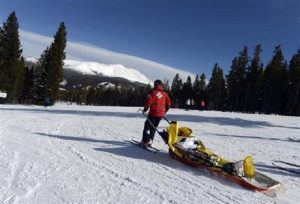
Everyone who has gone skiing is familiar with purchasing a lift ticket. However, many times the lift ticket contains a “Release from Liability” clause in very fine print on the back. If you are injured on the ski slopes through the negligence of an employee of the ski resort, can you sue? According to Philadelphia personal injury lawyer Edith Pearce, “It might depend on who bought the lift ticket and whether the injury is to a minor.”
In one case, an injured snow tuber filed a premises liability lawsuit alleging an employee of the ski resort caused the accident regarding the placement a barrier wall. A Pennsylvania Court denied the ski resort’s (Shawnee) defense that the case should be thrown out because the snow tubing ticket had a “Release of Liability” clause. In that case the injured victim had not signed or purchased the ticket, her husband had bought it. See the case, Beck–Hummel v. Ski Shawnee, 902 A.2d 1266 (Pa.Super.2006). In the Beck–Hummel case, the court stated that because the snow tubing ticket was purchased by the plaintiff’s husband, and contained inconspicuous disclaimer language on its reverse side, the disclaimer terms were not as a matter of law clearly understood by the plaintiff. However, in a different case where an injured skier actually signed a release form, the Pennsylvania Court held that the “Release” was binding, and the injured skier could not sue the skiing resort. See Chepkevich v. Hidden Valley Resort, L.P., 2 A.3d 1174 (Pa. 2010). The Chepkevich court noted that it does not matter that a person who signs a contract does not read the contract or understand it. While every case is different, it appears that if the injured skier did not actually buy the lift ticket and did not sign a release, a court may find that the “Release” is not binding, unless the Release was communicated clearly and conspicuously to the injured skier in another way (e.g., employee verbally told the skier or very prominent signage was posted).
However, the law is different for skiing accidents involving children’s injuries. Since “Release from Liability” clauses on tickets are based on contract law, a minor child who signs this type of release or purchases a ticket with this language can generally still sue and the “contract” release is not binding. In Byrne v. Simco Sales Service of Penna., Inc., 179 F.Supp. 569 (E.D.Pa.1960), a minor in Pennsylvania working as an ice cream truck driver was killed while driving the truck. The boy had signed a contract with a clause holding the ice cream truck company harmless for any injury arising from the use of the truck. The Court held that this clause was not enforceable because Pennsylvania’s policy of protecting minors by denying enforcement of their contracts (other than contracts for necessities) was applicable where the minor had contracted away his right to recover damages.







